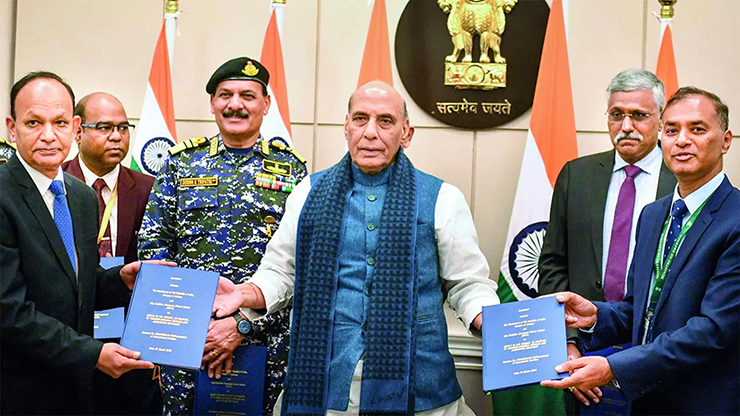
New Delhi: Unveiled during DefConnect 2024 in New Delhi, the Indian government has launched the Acing Development of Innovative Technologies with iDEX (ADITI) scheme to bolster defence capabilities and reduce dependency on foreign imports. The scheme ADITI aims to promote innovation in critical and strategic defence technologies by providing grants of up to Rs 25 crore to eligible start-ups for research, development, and innovation endeavours in defence technology.
The ADITI scheme has been allocated a budget of Rs 750 crore for the period 2023-24 to 2025-26. Its primary objective is to develop approximately 30 deep-tech critical and strategic technologies, thereby enhancing India’s defence capabilities and reducing dependence on foreign imports.
The ADITI scheme, under the broader framework of the Innovations for Defence Excellence (iDEX) program, administered by the Department of Defence Production (DDP), Ministry of Defence, encompasses collaboration between the government and the armed forces, with specific challenges identified by the Indian Army, Navy, Air Force, and Defence Space Agency. By leveraging the expertise of start-ups and the creativity of young innovators, ADITI aims to accelerate the development and deployment of indigenous defence solutions, thereby bolstering India’s defence preparedness and resilience.
Emphasising the importance of nurturing indigenous capabilities and fostering innovation in the defence sector, Defence Minister Rajnath Singh highlighted the expansion of support for young innovators through initiatives like iDEX Prime, where assistance has increased from Rs 1.5 crore to Rs 10 crore. This enhanced support aims to incentivize innovation, attract talent, and catalyse the growth of a vibrant defence innovation ecosystem in the country.
Reiterating the government’s commitment to achieving self-reliance in defence technology, Singh emphasised the need for mastering state-of-the-art defence technologies to ensure national security and sovereignty. He outlined two approaches to achieving technological self-reliance: adopting the latest innovations from other countries and developing indigenous capabilities through research and development (R&D).
Defence Minister Singh highlighted the significant growth in domestic defence production, with the sector surpassing Rs one lakh crore in revenue, a testament to the success of government policies aimed at promoting indigenous manufacturing and innovation. Efforts towards self-reliance also include measures to boost domestic defence production, such as earmarking 75% of defence capital procurement budget for Indian companies. Additionally, the government has taken proactive steps to create an enabling ecosystem for private sector participation in defence manufacturing. Singh emphasised the symbiotic relationship between governance, commerce, and private sector growth, stressing the need for collaboration between the government and industry to achieve the goal of self-reliance in defence production.
Initiatives like the Defence India Start-up Challenge (DISC) and the iDEX internship program play a crucial role in nurturing talent, fostering innovation, and bridging the gap between academia, industry, and the defence establishment. DISC introduces problem statements aimed at addressing critical defence challenges, inviting innovators to propose solutions that enhance defence capabilities and contribute to national security. The launch of initiatives like the ADITI scheme underscores the government’s commitment to promoting innovation, entrepreneurship, and self-reliance in defence production.
These initiatives are poised to accelerate India’s journey towards becoming a global leader in defence technology and innovation by empowering start-ups, nurturing indigenous capabilities, and fostering collaboration between government, industry, and academia.















